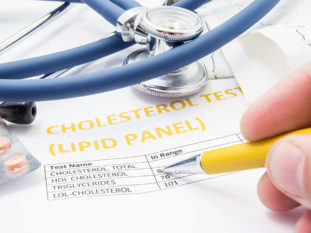Lipid Panel Test Quick Facts: When and why to test your cholesterol
Which cholesterol test is right for me?
Cholesterol test technology has been around a long time, and there are many options for testing your cholesterol. But which test is right for you? We’ll help you find the best test to meet your health goals. You need to know more than just your Total Cholesterol score. Comprehensive lipid panel tests include all of the important basic cholesterol components so that you can optimize your cholesterol balance. Lipid Panel tests should include at least the following component scores:
- Total Cholesterol
- HDL Cholesterol (good cholesterol)
- LDL Cholesterol (bad cholesterol)
- Triglycerides
How often should you test your cholesterol?
As beneficial as cholesterol tests are, optimizing your cholesterol health is impossible to do if you aren’t measuring it frequently enough. To get a clearer picture of your heart, blood vessel, and metabolic health, you need a comprehensive lipid panel test at least every year– ideally a few times per year if you are trying to make a health change.
Think about it this way…
If you were trying to lose weight, would you weigh yourself just once per year? Of course you wouldn’t. You could not accurately determine whether your diet and exercise efforts were making a difference without regularly stepping on the scale. In the same way, you need to measure your cholesterol more frequently than once per year if you want to make a lasting change or optimize your cholesterol score.
You need to measure your cholesterol more frequently than once per year if you want to make a lasting change.
What’s the best cholesterol test for improving wellness?
There are lots of options out there, but the best cholesterol test for improving wellness for most people is one that is:
- Accurate and precise
- Easy to use
- Easy to interpret
- As painless as possible
- Reasonable cost
At Bloodscore, we did all the hard work for you. Our test provides all of the wellness results you need (total cholesterol, HDL, LDL, triglycerides, HS-CRP inflammatory marker, and A1C blood sugar), while being user-friendly enough to take the test a few times per year. Your Bloodscore test includes a do-it-yourself lipid panel and more. With this single test, we are able to measure your total cholesterol, HDL cholesterol, LDL cholesterol, triglycerides, and more.
What’s the difference between all of the cholesterol tests on the market?
There are lots of ways to test your cholesterol, but we categorize them in two main buckets:
1. Wellness screening: Traditional lab vs. Do-it-yourself
2. Advanced tests for cholesterol problems
Wellness screening cholesterol tests have traditionally been performed in doctor’s offices or labs, where blood is collected from your arm with a big needle. Do-it-yourself cholesterol tests use new technology that makes it possible to get the same lab scores (total cholesterol, HDL, LDL, triglycerides, etc.) with just a tiny drop of blood. That’s right, you can get a ton of accurate information off of just a tiny drop of blood!
If your wellness screening cholesterol results indicate an elevated risk of heart disease, then it might be a good idea to consider advanced cholesterol tests. The wellness tests discussed above divide total cholesterol levels into three main components (HDL, LDL, and triglycerides), whereas advanced cholesterol tests split out those three components even further. This allows you and your health care provider to understand more about the makeup of your cholesterol and dial in on your cholesterol needs. Your health care provider can give you more accurate suggestions on the best medicine or lifestyle choices to improve your cholesterol and reduce your heart disease risk.
How often should I take a cholesterol test?
People who are serious about improving their cholesterol monitor their scores at least a few times per year. That may be surprising since you’ve most likely had your cholesterol tested only once per year– at best! If you are serious about making a change, then measuring your cholesterol once per year is not enough!
What do my total cholesterol results mean?
National guidelines recommend keeping total cholesterol under 200 mg/dL. Total cholesterol is a combined count of other cholesterol components, and optimal balance of those components is very important to your overall wellness.
Your goal is to keep your HDL over 60 mg/dL. Specific recommendations differ a bit based upon whether you are a male or female. Men have it a little easier, with recommendations to keep HDL above 50 mg/dL–but at or above 60 mg/dL would be a bit better for all males and females (according to National Cholesterol Education Program (NCEP) Adult Treatment Panel III guidelines). LDL cholesterol should remain under 100 mg/dL and triglycerides below 150 mg/dL. You can learn more detail about optimal cholesterol balance here.
Trends point out problems before it’s too late!
Is it enough to just know that you are within the national guidelines? We don’t think so. You need to know more about your scores in order to optimize your cholesterol. Following a trend is a much better way to keep pace with your health, and all of the information is already out there. We think YOU deserve easy access, and we’re making it easy for you to understand and share your Bloodscore Dashboard and results with your healthcare provider.
Sources:
http://www.mayoclinic.org/diseases-conditions/high-blood-cholesterol/home/ovc-20181871
https://labtestsonline.org/understanding/analytes/cholesterol/tab/test/


